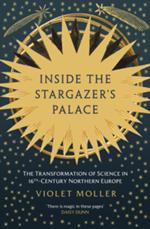In 1543, Nicolaus Copernicus declared the earth revolved around the Sun, overturning centuries of scholastic presumption. A new age was coming into view, one guided by observation, technology and logic. But omens and elixirs did not disappear from the sixteenth-century laboratory. Charms and potions could still be found nestled between glistening brass instruments and leather-bound tomes. The line between the natural and supernatural remained porous, yet to be defined. From the icy Danish observatory of Tycho Brahe, to the smoky, sulphur-stained workshop of John Dee, Violet Moller tours the intellectual heart of early European science. Exploring its rich, multidisciplinary culture, Inside the Stargazer’s Palace reveals a dazzling forgotten world, where all knowledge, no matter how arcane, could be pursued in good faith.

Inside the stargazer’s palace
ISBN: 9780861549818
Format: Paperback
Publisher: Oneworld
Origin: GB
Release Date: December, 2025
154235

